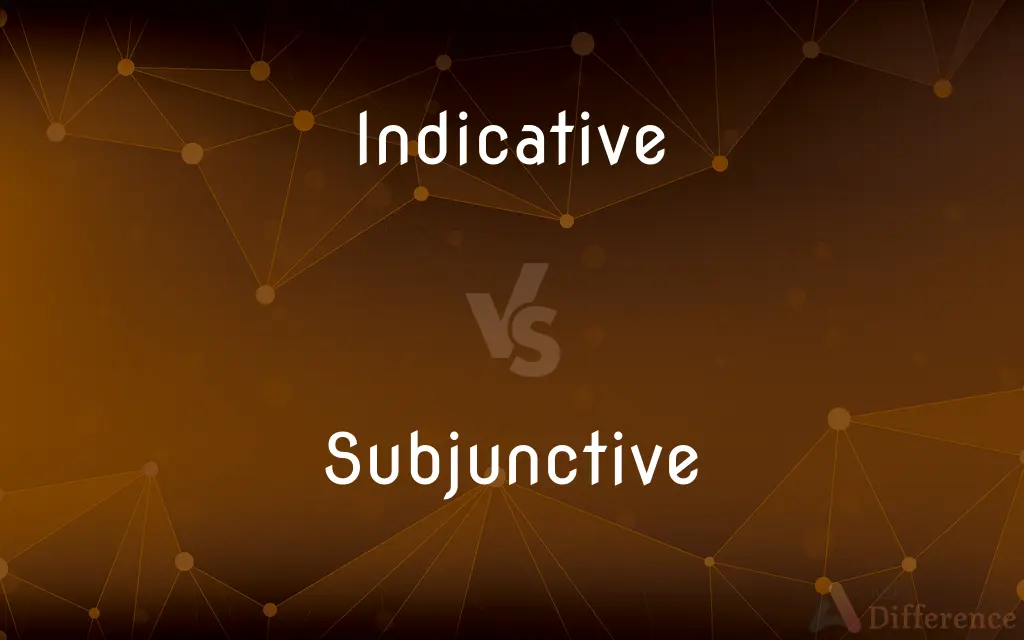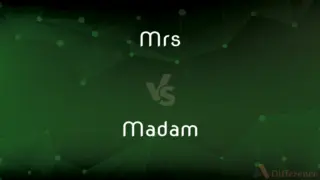Indicative vs. Subjunctive — What's the Difference?
By Tayyaba Rehman — Updated on September 22, 2023
The Indicative states facts or asks questions; the Subjunctive expresses wishes, doubts, or hypotheticals.

Difference Between Indicative and Subjunctive
Table of Contents
ADVERTISEMENT
Key Differences
The Indicative mood in the English language is used for statements of fact or for questions. It represents the objective reality of statements. Conversely, the Subjunctive mood is employed to express wishes, doubts, suggestions, commands, or hypothetical situations. It does not necessarily represent reality.
Indicative verbs often appear in everyday sentences. They express actions that are certain or questions that seek information. The Subjunctive mood, on the other hand, often appears in more complex sentences. Its use can convey scenarios that are speculative or not yet realized.
In many sentences, the distinction between Indicative and Subjunctive can change the meaning entirely. For instance, the Indicative "He was" suggests a statement of fact, while the Subjunctive "If he were" introduces a hypothetical. The Subjunctive mood often interacts with certain keywords like "if," "wish," "suggest," or "demand."
Understanding the difference between Indicative and Subjunctive moods is crucial for mastering nuanced expression in English. The Indicative grounds statements in reality, whereas the Subjunctive ventures into the terrain of the hypothetical, the wished-for, or the uncertain.
Comparison Chart
Purpose
States facts or asks questions
Expresses wishes, doubts, or hypotheticals
ADVERTISEMENT
Representation
Objective reality
Speculative or not necessarily real scenarios
Common Sentences
Everyday, factual sentences
Complex sentences with wishes, suggestions, or conditions
Interaction with Keywords
Rarely interacts with specific keywords
Often appears with "if," "wish," "suggest," "demand," etc.
Reality
Grounded in reality
Ventures into hypotheticals or uncertainties
Compare with Definitions
Indicative
Used for objective statements or questions.
They went to the store.
Subjunctive
Conveys scenarios not grounded in certainty.
If he were rich, he would buy a mansion.
Indicative
Conveys actions that are certain.
She reads books every night.
Subjunctive
Indicates desires, advisories, or hypothetical conditions.
It's essential that she be on time.
Indicative
Represents the objective reality of statements.
Dogs are animals.
Subjunctive
A grammatical mood expressing wishes or hypotheticals.
I wish she were here.
Indicative
Predominantly found in everyday sentences.
I will call you tomorrow.
Subjunctive
Used for suggesting, commanding, or doubting.
I suggest that he study harder.
Indicative
Serving to indicate
Symptoms indicative of anemia.
An insignia indicative of high rank.
Subjunctive
Commonly linked with specific conjunctions or verbs.
They demanded that the law be changed.
Indicative
(Grammar) Of, relating to, or being the mood of the verb used in ordinary objective statements.
Subjunctive
Of, relating to, or being a mood of a verb used in some languages for contingent or hypothetical action, action viewed subjectively, or grammatically subordinate statements.
Indicative
The indicative mood.
Subjunctive
The subjunctive mood.
Indicative
A verb in the indicative mood.
Subjunctive
A subjunctive construction. See Usage Note at if.
Indicative
Serving as a sign, indication or suggestion of something
He had pains indicative of a heart attack.
Subjunctive
Inflected to indicate that an act or state of being is possible, contingent or hypothetical, and not a fact.
Indicative
(grammar) of, or relating to the indicative mood
Subjunctive
Ellipsis of subjunctive mood
Indicative
The indicative mood.
Subjunctive
(countable) A form in the subjunctive mood.
Indicative
A term in the indicative mood.
Subjunctive
Subjoined or added to something before said or written.
Indicative
Pointing out; bringing to notice; giving intimation or knowledge of something not visible or obvious.
That truth is productive of utility, and utility indicative of truth, may be thus proved.
Subjunctive
The subjunctive mood; also, a verb in the subjunctive mood.
Indicative
Suggestive; representing the whole by a part, as a fleet by a ship, a forest by a tree, etc.
Subjunctive
A mood that represent an act or state (not as a fact but) as contingent or possible
Indicative
The indicative mood.
Subjunctive
Relating to a mood of verbs;
Subjunctive verb endings
Indicative
A mood (grammatically unmarked) that represents the act or state as an objective fact
Indicative
Relating to the mood of verbs that is used simple declarative statements;
Indicative mood
Indicative
(usually followed by `of') pointing out or revealing clearly;
Actions indicative of fear
Indicative
A grammatical mood stating facts.
The sky is blue.
Common Curiosities
Are Indicative sentences commonly used?
Yes, the Indicative appears in everyday, factual sentences that convey certain actions or states.
Can changing from Indicative to Subjunctive alter a sentence's meaning?
Absolutely, the choice between Indicative and Subjunctive can significantly change a sentence's implication.
Is the Subjunctive mood linked to any specific keywords?
Yes, the Subjunctive often appears with words like "if," "wish," "suggest," or "demand."
What is the Indicative mood used for?
The Indicative mood states facts or asks questions, representing objective reality.
Is the Indicative mood subjective?
No, the Indicative mood is objective, stating facts or asking questions.
Do other languages have Indicative and Subjunctive moods?
Yes, many languages have both moods, though their usage and rules can differ.
When should the Subjunctive mood be used?
The Subjunctive expresses wishes, doubts, suggestions, commands, or hypothetical situations.
Is it correct to say "I wish she was here" using the Indicative?
The preferred Subjunctive form is "I wish she were here," though informal speech may sometimes use the Indicative form.
Are there many verbs that require the Subjunctive mood?
There are specific verbs and expressions, like "suggest," "demand," or "essential," that commonly use the Subjunctive.
Is the Subjunctive becoming less common in modern English?
Some forms of the Subjunctive are less frequent in informal speech, but it remains an essential grammatical concept.
Share Your Discovery

Previous Comparison
Tongan vs. Samoan
Next Comparison
Mrs vs. MadamAuthor Spotlight
Written by
Tayyaba RehmanTayyaba Rehman is a distinguished writer, currently serving as a primary contributor to askdifference.com. As a researcher in semantics and etymology, Tayyaba's passion for the complexity of languages and their distinctions has found a perfect home on the platform. Tayyaba delves into the intricacies of language, distinguishing between commonly confused words and phrases, thereby providing clarity for readers worldwide.
















































